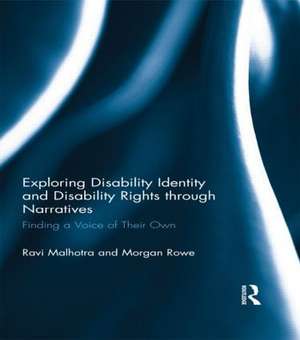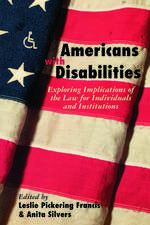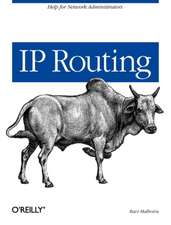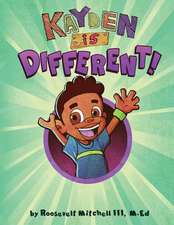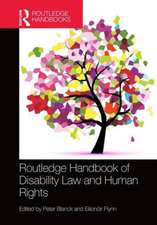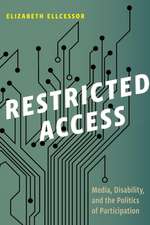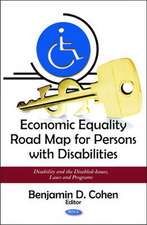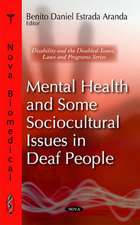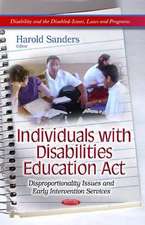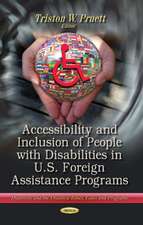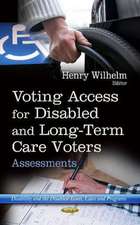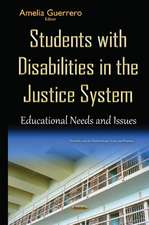Exploring Disability Identity and Disability Rights through Narratives: Finding a Voice of Their Own
Autor Ravi Malhotra, Morgan Roween Limba Engleză Paperback – 10 apr 2015
The book underscores how both physical and attitudinal barriers by educators, employers and service providers complicate the lives of disabled people. The book places a particular focus on the importance of political economy and the changes to the labour market for understanding the marginalization and oppression of people with disabilities. By melding socio-legal approaches with insights from feminist, critical race, and queer legal theory, Ravi Malhotra and Morgan Rowe ask if we need to reconsider the social model of disablement, and proposes avenues for inclusive legal reform.
| Toate formatele și edițiile | Preț | Express |
|---|---|---|
| Paperback (1) | 461.14 lei 6-8 săpt. | |
| Taylor & Francis – 10 apr 2015 | 461.14 lei 6-8 săpt. | |
| Hardback (1) | 1228.65 lei 6-8 săpt. | |
| Taylor & Francis – 9 oct 2013 | 1228.65 lei 6-8 săpt. |
Preț: 461.14 lei
Preț vechi: 485.40 lei
-5% Nou
Puncte Express: 692
Preț estimativ în valută:
88.26€ • 91.80$ • 73.96£
88.26€ • 91.80$ • 73.96£
Carte tipărită la comandă
Livrare economică 13-27 martie
Preluare comenzi: 021 569.72.76
Specificații
ISBN-13: 9781138918825
ISBN-10: 1138918822
Pagini: 248
Dimensiuni: 156 x 234 x 20 mm
Greutate: 0.36 kg
Ediția:1
Editura: Taylor & Francis
Colecția Routledge
Locul publicării:Oxford, United Kingdom
ISBN-10: 1138918822
Pagini: 248
Dimensiuni: 156 x 234 x 20 mm
Greutate: 0.36 kg
Ediția:1
Editura: Taylor & Francis
Colecția Routledge
Locul publicării:Oxford, United Kingdom
Public țintă
PostgraduateCuprins
1. Disability Rights, Narratives and Identities: An Overview 2. Methodology 3. Educational Barriers 4. Employment Barriers 5. Transportation Barriers 6. Gendered Expectations, the Body and Identity 7. Toward an Inclusive Society
Recenzii
'What makes it unique is its focus on legal issues...A further strength of the book is the delicate balance between rich personal narratives and coverage of societal legal issues...But perhaps more importantly, there is an abundance of scholarship in this book that allows readers to choose what they want to focus on, and likely repeatedly return to this book.'- Maria I. Medved, associate professor of psychology and psychiatry at the University of Manitoba, PsycCRITIQUES, April 2015
"Overall, the excerpts from the students’ narratives throughout the book paint a vivid and detailed picture of the advocacy mechanisms employed and emotions experienced to manage and challenge societal barriers, making this a very compelling and informative read. Their text makes a substantial contribution to understanding the relationship between disability identity, disability rights awareness, and an advocacy identity. As a result, I recommend the work to a broad audience." - Samantha Butler, Carleton University, October 2016
"Overall, the excerpts from the students’ narratives throughout the book paint a vivid and detailed picture of the advocacy mechanisms employed and emotions experienced to manage and challenge societal barriers, making this a very compelling and informative read. Their text makes a substantial contribution to understanding the relationship between disability identity, disability rights awareness, and an advocacy identity. As a result, I recommend the work to a broad audience." - Samantha Butler, Carleton University, October 2016
Descriere
Building on David M. Engel and Frank W. Munger’s groundbreaking work analyzing the narratives of people with physical and learning disabilities, this book is based around a series of qualitative interviews of young Canadian adults with physical disabilities. Addressing the theoretical underpinnings and current scholarship on disability identity the book considers the changes to the labour market in a globalized economy in order to understand the marginalization and oppression of people with disabilities. Through a thorough engagement with the narratives Ravi Malhotra and Morgan Rowe propose avenues for inclusive legal reform and ask if we need to reconsider the social model of disablement.
